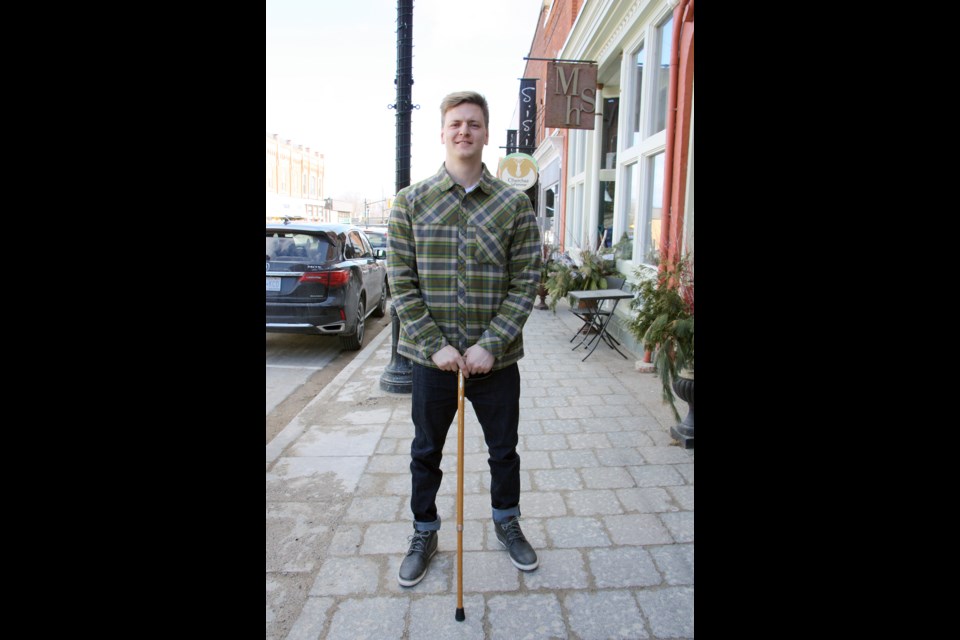Rod Crane may have to sit down to ski or play hockey, but he got there by getting off the couch.
At 18-years-old, Crane suffered incomplete paraplegia from a spinal cord injury.
While it wasn’t a complete severance of his spinal cord, it was enough to land him in a wheelchair.
He was told “You’ll get back as much as you put in,” by his doctors.
Now he’s a contender for two national sports teams and has to choose which sport he will play competitively and which will be recreational.
Crane is on a competitive sledge hockey team called the Elmvale Bears and he is also a para alpine racer on the competitive circuit. Soon, he’ll have to choose between the two sports and when he does, there’s one goal in his mind – the Paralympics in 2022.
Crane grew up in Heathcote, Ontario as an active kid. He played stand-up hockey as a goalie for 12 years, skied as often as he could and was willing to try anything athletic.
On March 10, 2010, a backflip on a trampoline went wrong and he shattered his first lumbar vertebra.
He finished rehab in July and went to college that September for recreation therapy. He went with his best friend.
His challenge in the months following his injury was simple.
“Having the drive to get out of the house,” he said. “It was more a mental game than anything.”
At 18 years old, his life had changed significantly, but going to school right away quickly built up his independence.
By 2014, he started playing sledge hockey, thanks to an introduction to the Elmvale Bears by his social worker from the hospital.
“It was a dream come true [to play hockey again],” he said. “Hockey was really special to me. I grew up on the rink, I made friends there, I learned a lot of life lessons from hockey. It was humbling to be back on the ice.”
He now plays defence, and says sledge hockey is a more physical and faster game than stand up hockey.
He's noticed the adaptive sports community is a tight-knit group. They are fierce competitors, but there's a bond that comes from understanding each other's struggles and the effort to overcome injury and disability. Playing hockey and connecting with the adaptive sports community helped Crane learn his spinal cord injury was not a death sentence.
“There’s lots you can do after a spinal cord injury,” he said.
The following year, Crane went to sit ski an event put on by Spinal Cord Injury Ontario at a local ski hill.
“It was about minus 40 that day, there were about five people skiing,” recalls Crane. “They pretty much had to pull me off the hill.”
He couldn’t get enough of that bitter wind slapping him in the face.
Now Crane faces a choice between skiing or hockey at a competitive level – but he won’t give either one up entirely. Whichever he chooses, the other will remain a recreational pursuit.
But adaptive sports are expensive. A local business sponsored his hockey sledge to the tune of $1,200. Now he needs his own mono ski, which is about $6,000 plus the cost of the skis, bindings and outriggers.
“It’s an expensive endeavour, but the experience outweighs the cost,” said Crane.
He’s started a GoFundMe page where the community has been quick to donate toward Crane’s pursuit of adaptive sports.
Crane now works at Errinrung Nursing Home and Retirement Residence in Thornbury as an activationist by helping run some of the therapy programs for residents.
He initially took recreational therapy in the hopes of working with young people with disabilities – including those who suffered spinal cord injuries as he had – but he finds his work with seniors very rewarding.
“It doesn’t matter how down you feel going into work, you come home feeling good,” he said.
His advice to others who face a spinal cord injury such as his?
“Quit thinking about it and do it,” he said. “I thought about hockey from the day it happened, and it took me four years to try it.”
Click here to support Crane’s Go Fund Me campaign to help him buy the adaptive sports equipment he’ll need to be on a national team.



